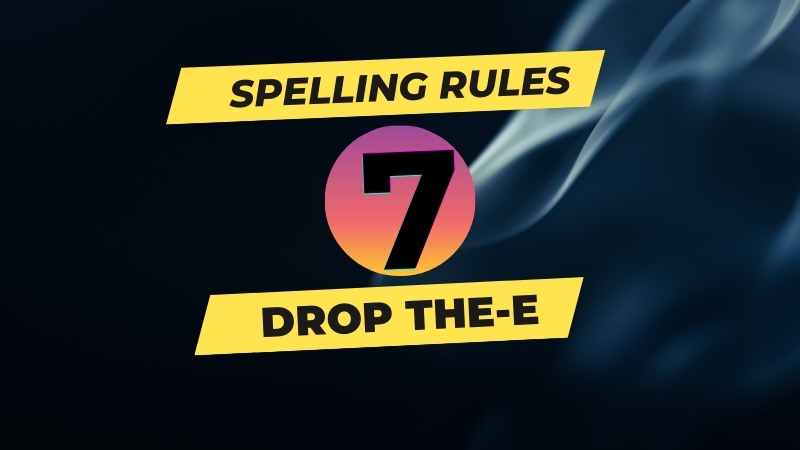Spelling Rule-7: The drop the 'e' rule
The drop the ‘e’ rule is a great little rule to know but be warned like all English spelling rules there are exceptions, which we’ll look at too. Do you know, which is correct and why?
writeing or writing?
excitement or excitment?
nerveous or nervous?
lovely or lovly?
write + ing (drop the ‘e’ with –ing) = writing
excite + ment = excitement
nerve + ous (drop the ‘e’) = nervous
love + ly = lovely
Spelling Rule-7.1: We usually drop the ‘e’ when adding a vowel suffix ending.
-ing, -ous, -ed, -er, -est, -ise/-ize, -or, ary/ery, -ish, -ur, -ent/-ence, ant/ance, -age, ive, -al
(There are a few exceptions)
Spelling Rule-7.2: But we keep the ‘e’ with consonant suffixes – ly, -ment, -s, -ful, -ness:
Love+ly=lovely
Excite+ment=excitement
Hope+ful= hopeful
Make+s=Makes
(but there are a few exceptions)
Spelling Rule-7.3: Y sometimes is used as a vowel. When we add y to the end of words it becomes a vowel suffix and we drop the ‘e’ .
ease + y = easy,
laze + y = lazy,
stone +y = stony,
shake + y = shaky
BUT keep the ‘e’ in matey.
Spelling Rule-7.4: Rules and patterns of drop the ‘e’ drop the ‘e’ with –ing
make – making
have – having
write – writing
love – loving
come – coming
use – using
move – moving
blame – blaming
give – giving
size-sizing
notice- noticing
manage- managing
notice – noticing
persuade – persuading
receive – receiving
achieve – achieving
amuse – amusing
believe – believing
become – becoming
create – creating
Exceptions:
singe +ing = singeing (means scorching not singing)
whinge – whingeing – stressing the soft g ( not winging)
binge – bingeing (not binging)
tinge – tingeing (not tinging)
dye – dyeing (not dying)
also: both spellings are correct in:
queue – queueing or queuing,
cue – cueing or cuing
BUT don’t drop the ‘e’ with :
be – being,
eye-eyeing
see – seeing,
agree – agreeing,
decree – decreeing,
foresee – foreseeing,
guarantee – guaranteeing,
flee – fleeing,
referee – refereeing
hoe+ ing = hoeing,
shoe +ing = shoeing,
toe +ing =toeing
Spelling Rule-7.5: Drop the ‘e’ with –ible
(to avoid having an –ei- pattern)
collapse- collapsible (collapseible)
sense- sensible
response – responsible
reverse – reversible
reduce – reducible
Spelling Rule-7.6: Drop the ‘e’ with –ed
(to avoid having 2 or 3 e’s)
age- aged (ageed)
excited – excited
balance – balanced
love – loved
use – used
guarantee – guaranteed
(we can’t have 3 e’s guaranteeed – wrong)
agree – agreed
Spelling Rule-7.7: Drop the ‘e’ with –acy
(to avoid an –ea- pattern)
conspire – conspiracy (conspireacy)
supreme – supremacy
Spelling Rule-7.8: Words ending in -ate loses
the ‘te’ and converts to -cy
accurate – accuracy
pirate – piracy
delicate – delicacy
Spelling Rule-7.9: Dropping the ‘e’ with the -able ending
adore – adorable
advise – advisable
believe – believable
conceive – conceivable
drive – drivable
desire – desirable
excite= excitable
excuse – excusable
forgive – forgivable
Spelling Rule-7.10: Careful with some differences between British and American spelling
British English/American English
sizeable/sizable
hireable/hirable
Spelling Rule-7.11:Some words have two possible forms before –able
like – likeable/likable
move – moveable/movable
love – loveable/lovable
name – nameable/namable
live – liveable/livable
sale – saleable / salable
but we drop the ‘e’ with -ing with all these liking,
naming, loving, blaming, giving, naming, sizing
Spelling Rule-7.12: With words ending in ‘-ge’ and ‘-ce’ we keep the ‘e’ before ‘able’ and ‘ous’ to keep the soft ‘g’ and ‘c’ sounds.
manage – manageable
change- changeable
marriage – marriageable
outrage – outrageous
notice – noticeable
replace – replaceable
knowledge – knowledgeable
advantage – advantageous
service – serviceable
trace – traceable
peace- peaceable
Spelling Rule-7.13: The final -e is not dropped from words ending in: -ee, -oe, -ye. ( to avoid the –ei-, -oi- patterns).
see – seeing, (seing)
agree – agreeing, agreeable
canoe – canoeist, canoeing, (canoing)
dye – dyeing, (keep the ‘e’ or it’ll be dying = dead)
flee – fleeing
foresee- foreseer, foreseeing, foreseeable
Spelling Rule-7.14: Words ending in -ue we drop
the ‘e’ with -ly
due – duly
true – truly
subtle – subtly
7.15: Important Notes
truly is one of the most misspelled words according to the Oxford Dictionary
We drop the ‘e’ in argument – argue + ment = argument (another common misspelt word)
acknowledgement and acknowledgment – both spellings are correct
judgement usually keeps the ‘e’
but lawyers spell it without the ‘e’ judgment
Spelling Rules
Spelling Rule- Before You Start: Part-A
Spelling Rule- 1: Syllables
Spelling Rule- 2 : English Words Never end with
Spelling Rule- 3 : “Y” acts as a consonant as well as a vowel
Spelling Rule- 4 : Two sounds of “C”
Spelling Rule- 5 : Two sounds of “G”
Spelling Rule- 6 : Magic-E/Silent-E
Spelling Rule- 7 : Drop the “e” rule
Spelling Rule-8: The 1:1:1 doubling-up rule
Spelling Rule-9: A E O U at the end of the Syllable
Spelling Rule-10: The Rabbit rule
Spelling Rule- Before You Start: Part-A
Spelling Rule- 11: The FLOSS/FLSZ rule
Spelling Rule- 12 : Use of C or K to pronounce K
Spelling Rule- 13: Use of /CH/ & /TCH/
Spelling Rule- 14: Use of /Cial/ & /Tial/
Spelling Rule-15: Two vowel’s sounds
Spelling Rule- 16 : Short Vowel Sounds
Spelling Rule- 17 : Long Vowel Sounds
Spelling Rule-18: Vowels in Short Words
Spelling Rule-19: Long Vowels’ Rules and Patterns
Spelling Rule-20: W is the Boss

